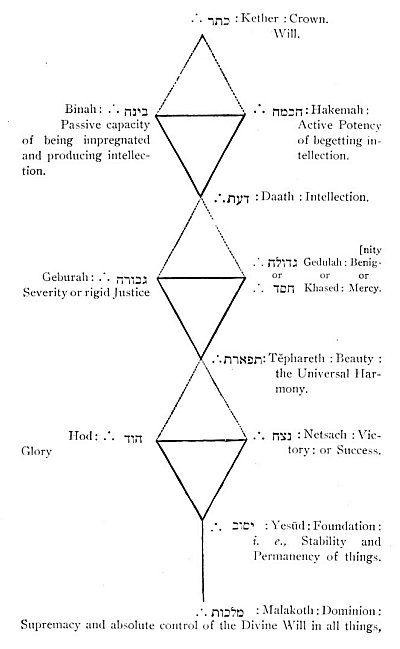Porphyry says: “By images addressed to sense, the ancients represented God and his powers–by the visible they typified the invisible for those who had learned to read, in these types, as in a book, a treatise on the Gods. We need not wonder if the ignorant consider the images to be nothing more than wood or stone; for just so, they who are ignorant of writing see nothing in monuments but stone, nothing in tablets but wood, and in books but a tissue of papyrus.”
Apollonius of Tyana held, that birth and death are only in appearance; that which separates itself from the one substance (the one Divine essence), and is caught up by matter, seems to be born; that, again, which releases itself from the bonds of matter, and is reunited with the one Divine Essence, seems to die. There is, at
p. 284
most, an alteration between becoming visible and becoming invisible. In all there is, properly speaking, but the one essence, which alone acts and suffers, by becoming all things to all; the Eternal God, whom men wrong, when they deprive Him of what properly can be attributed to Him only, and transfer it to other names and persons.
The New Platonists substituted the idea of the Absolute, for the Supreme Essence itself;–as the first, simplest principle, anterior to all existence; of which nothing determinate can be predicated; to which no consciousness, no self-contemplation can be ascribed; inasmuch as to do so, would immediately imply a quality, a distinction of subject and object. This Supreme Entity can be known only by an intellectual intuition of the Spirit, transcending itself, and emancipating itself from its own limits.
This mere logical tendency, by means of which men thought to arrive at the conception of such an absolute, the ὄν, was united with a certain mysticism, which, by a transcendent state of feeling, communicated, as it were, to this abstraction what the mind would receive as a reality. The absorption of the Spirit into that superexistence (τὸ ἐπέκεινα τῆς οὐσίας), so as to be entirely identified with it, or such a revelation of the latter to the spirit raised above itself, was regarded as the highest end which the spiritual life could reach.
The New Platonists’ idea of God, was that of One Simple Original Essence, exalted above all plurality and all becoming; the only true Being; unchangeable, eternal [Ἑις ὤν ἑνὶ τῷ νῦν τὸ ἀεὶ πεπλήρωκε καὶ μόνον ἐστι τὸ κατὰ τοῦτον ὄντως ὣν.]: from whom all Existence in its several gradations has emanated–the world of Gods, as nearest akin to Himself, being first, and at the head of all. In these Gods, that perfection, which in the Supreme Essence was inclosed and unevolved, is expanded and becomes knowable. They serve to exhibit in different forms the image of that Supreme Essence, to which no soul can rise, except by the loftiest flight of contemplation; and after it has rid itself from all that pertains to sense–from all manifoldness. They are the mediators between man (amazed and stupefied by manifoldness) and the Supreme Unity.
Philo says: “He who disbelieves the miraculous, simply as the miraculous, neither knows God, nor has he ever sought after Him; for otherwise he would have understood, by looking at that truly
p. 285
great and awe-inspiring sight, the miracle of the Universe, that these miracles (in God’s providential guidance of His people) are but child’s play for the Divine Power. But the truly miraculous has become despised through familiarity. The universal, on the contrary, although in itself insignificant, yet, through our love of novelty, transports us with amazement.”
In opposition to the anthropopathism of the Jewish Scriptures, the Alexandrian Jews endeavored to purify the idea of God from all admixture of the Human. By the exclusion of every human passion, it was sublimated to a something devoid of all attributes, and wholly transcendental; and the mere Being [ὄν], the Good, in and by itself, the Absolute of Platonism, was substituted for the personal Deity [ו ?Y?H?W?H] of the Old Testament. By soaring upward, beyond all created existence, the mind, disengaging itself from the Sensible, attains to the intellectual intuition of this Absolute Being; of whom, however, it can predicate nothing but existence, and sets aside all other determinations as not answering to the exalted nature of the Supreme Essence.

Moe is the founder of GnosticWarrior.com. He is a father, husband, author, martial arts black belt, and an expert in Gnosticism, the occult, and esotericism.





